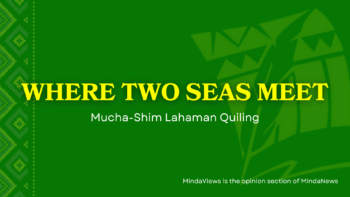GENERAL SANTOS CITY (MindaNews/29 June) — The International Conference on the Consolidation for Peace, the sixth of the series since 2006 (hence, COP6) was held in Hiroshima, Japan last June 23 – 25. COP1, COP2 and COP4 were inclusively for three different areas — Mindanao, Aceh and Southern Thailand. COP 3 and COP5 were exclusively for Mindanao, the series organizers, Japan International Cooperation Agency (JICA) and the Research and Education Unit, University Sains Malaysia (REPUSM), said in their Press Release.
“The seminar gathered about a hundred participants, more than half of them from Mindanao
and Manila. The participants include representatives from government, MILF, civil society and the Moro National Liberation Front,” reports MindaNews (June 24, 2014: PNoy, Murad in Hiroshima for seminar on BMoro peace pact implementation – hence, Mindanews:6-24-14 ).
REPUSM head, Prof. Dr. Kamarulzaman Askandar, said “… 2014 will be a year of obstacles and opportunities for the GPH-MLF peace process,” adding that … the seminar “will be an important opportunity for more GPH and MILF leaders to further discuss some of these challenges.” (MindaNews: 6-24-14) Point: Ignoring obstacles will negate opportunities.
NOTES
[1] COP6, exclusively for Mindanao, was aimed “to clarify the ongoing discussion in the GPH-MILF peace process and find ways to continue the momentum of the process” and was focused on three topics on “Bangsamoro socio-economic development (1), the institutionalization of the Bangsamoro government (2), and developments in normalization (3).” (Press Release)
[2] President Benigno Simeon C. Aquino III, MILF Chair Murad Ibrahim and Peace Secretary Teresita Quintos-Deles keynoted COP6. Negotiating panel chairs Prof. Miriam Coronel-Ferrer (GPH) and BTC Chair Mohagher Iqbal (MILF) addressed the conference — Representatives of Various stakeholders presented input papers for the seminar-workshop.
[3] President Aquino, before delivering his address on the second day, met Chairman Murad briefly – about 15 minutes. The latter unburdened to the President the MILF concerns about the review and revision of the Bangsamoro Basic Law (BBL) draft by the Office of the President (OP) legal team.
[4] Evidently, the event did not merit coverage from the Manila media. No report about it was in Manila media from the reporters in the President’s Tokyo visit entourage. None from the major newspaper or television covered the President’s keynoting COP6. The “You Tube” presentation by RTVMW of the Presidential Staff was not picked up by media outlets. Malacañang did not report the Aquino-Murad encounter until June 26. However, the Davao City-based MindaNews reported the event on June 24.
On the Three Topics
Did the sponsors and the participants, particularly the peace teams of the Philippine government and MILF, take note of two issues most crucially relevant to Topic 2 – the less than a year time for the transition proper of the Bangsamoro and the MILF concerns in relation to the review and revision of the BBL draft by the OP legal team? MILF Chair Murad confronted the President with these two issues in their brief encounter, so they must be of some concern.
Topic 1 is not an issue. National and international efforts for the socio-economic development of the ARMM that will become the Bangsamoro – with the active involvement of the MILF—have been going on. The successful institutionalization of the Bangsamoro will encourage the international donors to continue their assistance. Topic 3 will be adversely affected by snags in Topic 2.
JICA President Dr. Akihiko Tanaka pointed the significance of the signing of the CAB: first, it “will help promote further development in the Philippines”; second, it “can help improve conditions in Southeast Asia as a whole”; third, it would “help advance maritime connectivity in the region”. (MindaNews:6-24-14) He made a strong pitch for institutionalization not to fail.
On the Two Issues
However, the two issues emerging from Topic 2 are sources of concerns. If not addressed properly, they can adversely affect institutionalization.
GPH Panel Chair Ferrer, in her address,“cited five challenges in the post-signing phase” of the peace process: “[1] the element of time; [2] the parties to the agreement themselves; [3] sustaining public trust and support; [4] inclusivity and how to ensure that goodwill coming from international community is used judiciously; and, [5] that the support empowers a broad base of men and women and engenders self-reliance, not dependence.” (MindaNews: 6-24-14)
Challenges [2] to [5] reflect some cracks weakening the GPH –MILF mutual bridge of goodwill and confidence.
Guiamel Alim, chair of the Consortium of Bangsamoro Civil Society, in his presentation paper, identified those reacting to the CAB as the “hopefuls” or “re-affirmists;” the “doubtfuls” or “uncertains;” the “pessimists” or “rejectionists;” and the “curious minds”. Alim highlighted what Ferrer referred to as the third challenge..
Alim said the “curious minds and the doubtfuls” are questioning the constitutionality of the BBL. Besides, they raise these questions (MindaNews: 6-24-14):
- What happens if the MILF finds the Basic Law passed by Congress not responsive to their right to self-governance?
- What will happen if in the plebiscite other territories in the present ARMM will opt not to join the Bangsamoro?
- Will ministerial form of government be a good alternative to what we have today?
- What happens if in the post-agreement elections the MILF is politically excluded?
- Will they still pursue the agreement on normalization, particularly the decommissioning component?
- Can there be two claimants of ancestral domain in the Bangsamoro?
The point here is this: Being asked are not just “IF” questions but “PROBABLES” considering the complexities of prevailing circumstances and the conflicting interests of the “stakeholders” as well as the evident reservations among what Ferrer refers to as “parties in the agreements”.
The Unburdening
The 15-minute meeting of President Aquino and Chairman Murad was the unburdening. No cabinet official accompanied Aquino while Iqbal was with Murad. The Chairman “raised their concerns about the Malacanang-proposed revisions on the draft BBL” which they had “received only a few days ago”. Without disclosing details, he said he told the President of their concerns “one-by-one”. Among the concerns is the watering down of the BBL draft. (MindaNews, June 24, 2014: PNoy, Murad meet on concerns over draft Bangsamoro Basic Law)
While the President could not relieve them of their “concerns” on-the-spot, he promised to look into them; he would check with his legal team. In reality, the President and the Chairman were in a “gut situation”. Murad had to unburden because the BBL draft can no longer be compromised without rendering meaningless the envisioned Bangsamoro. But on the part Government, it has to be reviewed and revised “to refine” it to suit the constitutionalists within and outside of the Congress. The President is in a very unenviably uncomfortable situation.
Will Murad and the MILF get the “answers” that will calm down their concerns about the BBL draft getting watered down? The matter is too sensitive to be publicly discussed. The Palace has refused to open up to the media.
In the two reports of the Philippine Daily Inquirer last June 26, one by the PDI staff and the other from Agence France Press, Presidential spokesman Edwin Lacierda could only answer, “It is safe to assume that the draft Bangsamoro Basic Law was discussed,” when asked about the meeting of the President and Murad and what they discussed.
Iqbal, in a text message to the Inquirer confirmed the meeting; however, the details “cannot be disclosed yet”. On “how he feels” about the draft pending at the Office of the President, he said,
“I am not very upbeat about the chance of the GPH upholding the BBL we crafted.”
This “unburdening” gives sense to Ferrer’s second challenge and Alim’s Question No. 1 above.
From the Horses’ Mouths
President Aquino’s keynote speech was very well done. But it made no mention about the status of the BBL draft. The only allusion to BBL enactment was this: “I believe that all of us here today are bound by this hope (referring to the hoped for “peace, stability and harmony” in Mindanao). This is why my administration will work doubly hard to ensure that free, peaceful and democratic elections for the Bangsamoro government will take place come 2016.”
Peace Secretary Deles narrated the “ups” and “downs” of the peace process and the difficult road of the peace negotiation that ended in the signing of the CAB and drafting of the BBL. The draft will be submitted to the Congress in July as the BBL bill and its passage by the end of this year is assured. The plebiscite follows early in 2015, “ensuring a brief transition period until regional elections are held in May 2016.” The Bangsamoro is inaugurated.
She appealed: “Let us strive to identify and address potential problems and loopholes involving the socio-economic enablement of the newly minted region, the formal establishment of its governance structure, and the most crucial process of normalization. Through this forum, let us identify and strengthen our preparations in developing the means to build the required capacities that will, in turn, create legitimate and viable, all-inclusive, and lasting peace for Mindanao and the entire country.”
Chairman Murad and MILF Panel Chair Iqbal, (MindaNews 6-24-14), emphasized the same points expressing their concerns. Iqbal during Session 1 on the “Challenges for the Bangsamoro Future: Post-CAB” acknowledged the challenges ahead as “complex and stunning” but urged parties to ensure that the agreement is implemented in letter and spirit. (Emphasis supplied)
He continued: “Many a good agreement fails to address a particular problem and halt the conflict, because in the end, there is that tendency especially of the powerful partner to dilute the content of the political document like the CAB when the legislated form takes place. [The consequence would be] that the other party, usually the insurgent side, will be forced to swallow the hook, line and sinker offered to it or reject it outright.”
He warned: “In both scenarios, the conflict will continue to exist, oftentimes with much fury, because in the first case, other armed groups, usually the more radical ones which do not believe in peace negotiation will condemn the perceived sell-out and will carry on the struggle. In the second scenario, rejection of the watered down legislation would be the handiest recourse of the other party, say the MILF.”
Of the President: “Right now, I still have that faith (in) President Benigno Aquino III that he would not allow the impending full success story of the GPH-MILF peace process to just be waylaid by circumstances [because] real peace in Mindanao is truly befitting his legacy to the nation at large and the generations yet to come.
“The possibility of a watered down BBL is perhaps more in the mind of people rather than what he intends to do, in partner with Congress. After all, it was he who said time and again that he will not sign an agreement that he cannot implement. The MILF is holding on to this commitment of the President.”
Metaphorically Seeing
JICA President Dr. Akihiko Tanaka pointed the significance of the signing of the CAB. TheREPUSM head, Prof. Dr. Kamarulzaman Askandar, sees 2014 as a year of obstacles and opportunities, of thorns and roses. Unlike Dr. Tanaka, he wants the COP6 participants to see thorns and roses.
President Aquino and Secretary Deles see roses. Despite their admitting that the Bangsamoro will have a short transition period, they see its future and that of the country as very rosy. GPH Peace Panel Chair Ferrer sees the same despite the five challenges she raised.
MILF Chair Murad and MILF Peace Panel Chair Iqbal see more thorns than roses. They demand the implementation of agreements in letter and spirit and the powerful partner not to dilute the content of political documents like the CAB when being legislated into law – a clear reference to the review and revision of the BBL draft in the Office of the President and its repetition in the Congress. But they speak in riddle. While warning of dire consequence, they see the President as their rose.
We doubt if the President will take up with his legal team the concerns of Chairman Murad and ask them to undo the revisions they have done according to his instructions. We doubt if the President can prevail upon the Congress to consider the MILF concerns.
Will MILF swallow the revision hook, line and sinker or reject it outright? Metaphorically, will MILF play the game of chicken with the Office of the President and the Congress? Will it veer off the line to lose or keep to the line to smash up? (MindaViews is the opinion section of MindaNews. Patricio P. Diaz writes “Comment” and “Mind Da News” for MindaViews, the opinion section of MindaNews. The former editor in chief of the Cotabato City-based Mindanao Cross and later the Mindanao Kris, Mr. Diaz, now based in General Santos City, has written extensively about the Bangsamoro struggle and peace processes since the 1960s).






